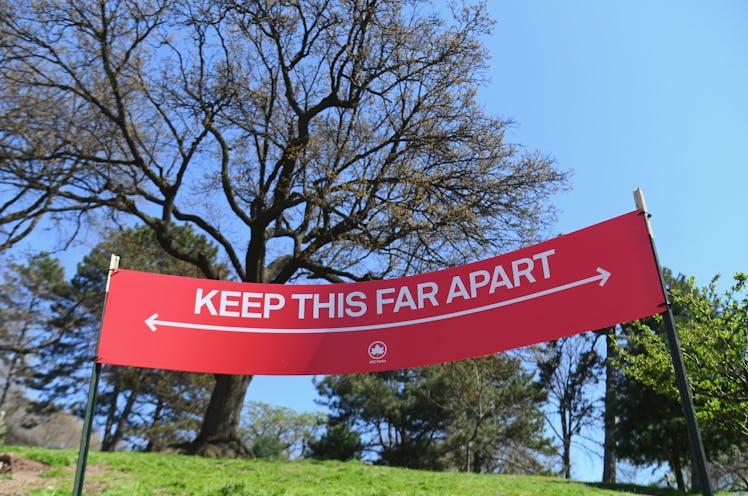
Don't Start Planning Your Post-Quarantine BBQ Just Yet
With more than 1,000,000 confirmed coronavirus cases across the United States as of May 1, many states have maintained or extended stay-at-home orders in order to limit the spread of the virus. But as the weather gets warmer and being outdoors becomes more tempting, people across the country are likely wondering — will coronavirus go away in the summer? Experts say it's impossible to know for sure, because there's still not enough research around the coronavirus.
Americans have long been familiar with flu season, which starts every fall — typically around October, according to the CDC — as temperatures drop and humidity goes down. According to NPR, cold, dry air is the perfect transmission environment for respiratory viruses like the flu, because respiratory droplets containing virus particles can live in the air longer when water vapor levels are lower. So, it may stand to reason to wonder if the novel coronavirus — which also causes a respiratory illness — will do the same. But according to Rachael Piltch-Loeb, Ph.D, a preparedness fellow at the Harvard T.H. Chan School of Public Health, the seasonality of the coronavirus is still a big question, especially because populations have not yet built up immunity to it.
"There is really limited evidence to show that this coronavirus will fade in the summer," Piltch-Loeb tells Elite Daily. "Sometimes with the seasonal flu as the summer approaches, it runs out of people to infect, either because they got the flu shot, or have prior immunity. With coronavirus this is not the case, because no one previously had immunity and there was no vaccine."
Not all flu outbreaks are seasonal, either. According to FiveThirtyEight, the outbreak of the H1N1 swine flu, which was a new flu virus, began in spring 2009 and was estimated to have killed hundreds of thousands of people around the world within a year. It took several years for the H1N1 virus to adopt a more seasonal pattern, per NPR. That is, in part, why scientists are skeptical that the coronavirus will peter out over the summer. Dr. Lee Riley, professor and chair of Berkeley Public Health's Division of Infectious Disease and Vaccinology, tells Elite Daily that climate may not necessarily impact the coronavirus.
"We don't know for sure this coronavirus will die down in summer," Riley says. "The fact that it's spreading quite efficiently now in places like Brazil suggests that warmer climate doesn't do much to this virus. With the influenza virus, the observation that it dies down in the summer may relate more to where the virus first appears than warmer or colder seasons."
As Riley points out, it's important to note that even as temperatures warm up heading into summer in the United States and the rest of the Northern Hemisphere, the Southern Hemisphere is about to transition into winter. Even if the coronavirus is more pervasive in the winter than in the summer, that would mean that countries in South America, Africa, and Oceania may start to experience higher rates of the virus in the coming months, but experts are still waiting to see how the virus behaves as the seasons shift.
"In Southern Hemisphere countries, the epidemic is in its early stages and will continue through their winter season," Riley says. "If international travel resumes in Northern Hemisphere countries in fall/winter, the virus from the Southern Hemisphere countries could get re-introduced."
As scientists try to figure out what could happen in summer, one test that might be useful is an accurate serosurvey — an antibody test — to check how many people may have antibodies that combat this particular coronavirus. According to Dr. John Swartzberg, an infectious disease specialist at UC Berkeley's School of Public Health, the coronavirus antibody tests that are currently available are often inaccurate, which makes it difficult for elected officials to make large-scale decisions about stay-at-home orders. Additionally, Swartzberg tells Elite Daily that a positive antibody test does not necessarily mean you are immune to the coronavirus.
"Our immune system makes a variety of antibodies to any infectious agent," Swartzberg says. "The antibodies that are detected by a test, we don’t know whether those antibodies represent protection to us." Piltch-Loeb adds that even if a positive antibody test does mean protection from the virus, it doesn't indicate how long "having antibodies protects you from another infection." That's why Swartzberg says that a combination of robust diagnostic and antibody testing, coupled with the development of a drug and a vaccine, will be necessary in order to slowly open the country back up again.
Ultimately, experts can't definitively say whether the coronavirus will dissipate over the summer or not, because there's just not enough data available to make that determination. Given how the coronavirus pandemic has been progressing this far, however, health care professionals are skeptical that the virus will fade away as soon as the summer hits, so it may be best to not start planning your annual getaway or family barbecue right away.
If you think you’re showing symptoms of coronavirus, which include fever, shortness of breath, and cough, call your doctor before going to get tested. If you’re anxious about the virus’s spread in your community, visit the CDC for up-to-date information and resources, or seek out mental health support. You can find all Elite Daily's coverage of coronavirus here.
Experts cited:
Rachael Piltch-Loeb, Ph.D, preparedness fellow at Harvard University's T.H. Chan School of Public Health
Dr. Lee Riley, MD, professor and chair of Berkeley Public Health's Division of Infectious Disease and Vaccinology
Dr. John Swartzberg, MD, FACP, clinical professor emeritus at the UC Berkeley School of Public Health's Division of Infectious Diseases and Vaccinology